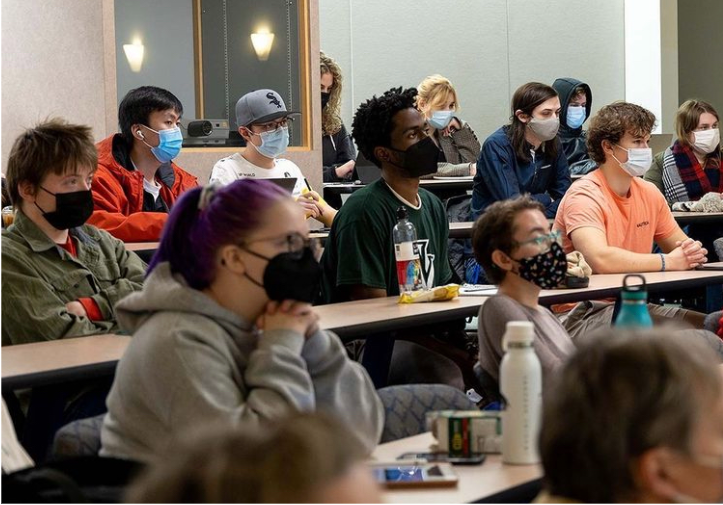
A panel on Ukraine took place on Tuesday, March 8 from 4-6 p.m. at CNS. Professors had the opportunity to discuss their thoughts on the Ukraine situation. The panel was organized by the political science honor society Pi Sigma Alpha and the International Studies honor society Phi Beta Delta.
IWU professors had much to say regarding the situation and its possible implications for regional stability, security, and human rights. According to the Wall Street Journal, for weeks, Mykolaiv, Ukraine, was on the front line. Infantry and Russian tanks made an attack into its streets. Russian artillery blew up civilian neighborhoods
Students heard from professor of history, Thomas Lutze, who gave an introduction on the role of women in the conflict; emeritus professor Irv Epstein on humanitarian concerns; adjunct professor of political science Julian Westerhout on impacts on Europe; professor of history April Schultz on protest and resistance in Russia; Lutze then spoke again later in the panel about China’s relations with Russia concerning this conflict. Professor of political science William Monroe moderated the panel.
“The panel was very well-attended and, clearly, everyone is very concerned about this attack on democracy and what it means in terms of a wider confrontation.” Schultz said.
Schultz spoke on behalf of retired Russian Languages and Literature Professor, Marina Balina, who could not attend the panel because she was attending a conference in Berlin.
One student pointed out the benefit of having Schultz reading a letter from Balina about her experience with oppression in Russia.
“I found Professor Schultz who read a piece written by Balina very impactful,” Kate Berman, senior political science student said. “Balina being from Ukraine made it especially [impactful].”
Berman said she was interested to hear Schultz’s comparison of the protests in Russia right now and the control of government on the people similar to the Soviet era.
Berman also said that Epstein’s talk on human rights violations exposed things she was unaware of.
“Human rights violations are being chronicled through social media with record speed,” Epstein said. “And the consequences of the human rights violations we are observing will have lasting effects for generations.”
About the future of the Ukraine situation, Berman believes in Ukraine.
“I believe that the people of Ukraine will win the war,” Berman said. “Russia has not done as well as I thought they would.”
“It hurts my heart to hear that the Russian people are also suffering at the hands of their own leader because of this senseless war,” Bailey Harvey, senior political science student said.
With Epstein’s statistics of refugees, the impact to the people of Ukraine is significant. “More than 2 million refugees have fled Ukraine; over one million are children and youth.” Epstein said. “The UNHCR has estimated that up to 7 million refugees will eventually need assistance.”
This growing statistic is necessary for the IWU community to take note of what is happening in Ukraine right now, so that they can think of possible solutions.
Harvey already thinks of a potential solution that could be underway.
“I unfortunately envision the need of other countries needing to become more involved in the war in Ukraine,” Harvey said. “Although, I don’t like to think of the extent they will need to become involved and the consequences of said involvement.”

